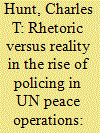| Srl | Item |
| 1 |
ID:
107840


|
|
|
|
|
| Publication |
2011.
|
| Summary/Abstract |
Although the concept of partnership offers little substantively new to the theory and practice of peace operations, it provides a useful political frame to advance reform efforts in UN policing. In the last few years, several improvements have been made in doctrine, training and increasing the pace of deployment. However, the case of Timor-Leste suggests that these efforts have not resulted in obvious improvements in the abilities of the UN Police (UNPOL) to carry out their mandated functions. Solutions offered by the New Horizon agenda are technical and do not address the political dimensions of the problems encountered in field missions. In Timor-Leste, the host government is not interested in engaging in a partnership with UNPOL. Problems with international policing may be so deep, complex and subject to politics that even substantial process-oriented solutions will not achieve significant results.
|
|
|
|
|
|
|
|
|
|
|
|
|
|
|
|
| 2 |
ID:
170414


|
|
|
|
|
| Summary/Abstract |
United Nations police (UNPOL) have become increasingly important to operational effectiveness of peace operations. For some time, their contribution to re-establishing the rule of law in conflict-affected states has been seen as a cornerstone for building sustainable peace and enabling mission exit strategies. In a departure from traditional peacekeeping and post-conflict assistance, recent years have seen UN peace operations directed to stabilise countries and protect civilians in the context of on-going violent conflict. As a result, UNPOL have had to undertake a range of expanded tasks, exacerbating long-standing challenges and producing new impediments to their operational effectiveness. At the same time, a ‘pragmatic turn’ is generating increased interest in more police-centric concepts of peacekeeping as a possible alternative to today’s expensive and military-focused peace operations. Drawing on extensive fieldwork in multiple peace operations and at UN headquarters, this article examines the changing roles of UNPOL in a new breed of UN peace operations, identifies the major associated challenges and proposes a series of recommendations for overcoming them. It argues that if police are to respond to unfolding challenges while becoming more central to peacekeeping outcomes, then significant reforms and further research into their impacts will be required.
|
|
|
|
|
|
|
|
|
|
|
|
|
|
|
|
| 3 |
ID:
089347


|
|
|
|
|
| Publication |
2009.
|
| Summary/Abstract |
Following the 2006 gang violence in Timor-Leste amid dissension between the two main security institutions in the country, the Timor-Leste Defence Force (F-FDTL) and the National Police of Timor-Leste (PNTL), the UN Security Council adopted Resolution 1704, establishing a UN multidimensional, integrated mission, including UN police with an executive policing mandate, to ensure the restoration and maintenance of public security. With the mission winding down in 2009, this article offers an early assessment of its accomplishments and setbacks in the realm of security and public order, emphasizing the UNPOL leg of the mission. If the mission succeeded in restoring a modicum of security in Timor-Leste, it fell short of effectively assisting the PNTL reform process, implying that another security crisis erupting in the country cannot be ruled out.
|
|
|
|
|
|
|
|
|
|
|
|
|
|
|
|